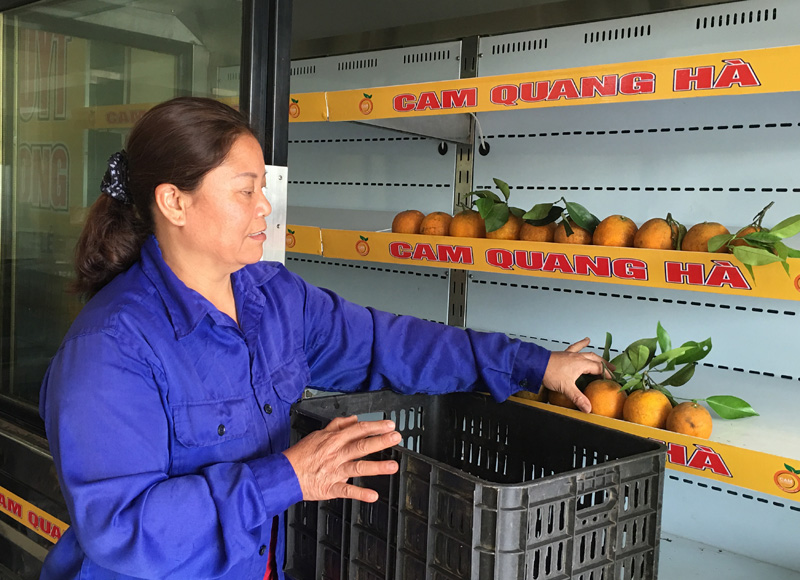
(HBO) – Production planning for orange production of northern Hoa Binh province is large but the province is yet to have effective solutions on consumption. As the orange’s consumption market depends on traders, the price the province’s specialty is low and unstable.
In addition, the Cao Phong One Member Company Limited with its key
role in orange production has not conducted its business restructuring and
production under VietGap standards. The fight against fake and imitate goods is
facing many difficulties while there are intermediary stages in the fruit value
chain. Those are among problems in management on Cao Phong orange’s
geographical indication.

The Ha Phong Agriculture and Services Cooperative (Cao Phong district) carried
out orange production under VietGap standards and stuck stamps of origin to
manage the products.
Cao Phong district is home to more than 2,800ha of citrus trees, including
1,900ha of orange, over 900ha of tangerine and grapefruit. The commercial
Orange growing area hit more than 1,200ha, while the
remaining area is in building process. Output in the 2017-18 crop reached over
33,000 tonnes. Production under VietGap standards in recent years has been
implemented in each household.
The district allocated 423.36 hectares of land to 315 households growing
oranges under VietGap standards. In 2014, nearly 47ha of land was granted to 15
families, while 100 households received 59.5ha of land in 2015. About 141.9ha
and 164.6ha of land were given to 120 and 87 families in 2016 and 2017,
respectively. Those households following VietGap standards were mainly in the communes
of Bac Phong, Dung Phong and Thu Phong, and Cao Phong township. There are two
organisations granted a certificate of geographical indication.
Besides, some businesses were pioneers in using stamps citing product origin,
namely Hung Phong company, Ha Phong and Anh Tu Cooperatives and Mr Bang in Cao
Phong township.
In the 2017-18 crop, those firms used more than 20,000 stamps of origin. The
district’s farmer association used about 7,000 stamps with bar code to track
origin. Besides, all 315 households received the certificate of VietGap
standards using bar code to manage and trace product origin.
Annual festivals and orange trade fairs have contributed to
introducing Cao Phong orange to visitors. The orange was granted the
certificate of "Famous brand name in 2016”, being among 10 well-received products,
which contributed to raising its value.
In the previous crop, the province discovered and strictly punished one
household making fake packaging of the Cao Phong One Member Limited Company,
confiscating more than 1,900 imitation wrappings. In 2017-18 crop, there is no
such case reported. The price of Cao Phong orange is stable and no other types
of orange is mixed with Cao Phong oranges./.
Hoa Binh province’s economy posted an impressive Gross Regional Domestic Product (GRDP) growth rate of 12.67% in the first quarter of 2025, representing a 12.76% year-on-year increase, the highest rate recorded since the beginning of the current tenure, according to the provincial Statistics Office. This robust growth reflects years of strategic groundwork and sets a strong foundation for the province’s annual growth target of over 10%.
With a focus on cash crop farming with science - technology application and brand building, Lac Thuy district is gradually increasing production value, improving people's life quality, and laying the foundation for sustainable socio-economic development.
In recent years, the economic development model "Hoa Binh Earthworm Farm” run by Mr. Bui Van Dang in Co Giua Hamlet, My Thanh Commune (Lac Son district) has not only brought stable economic value but it is also environmentally friendly, helping to protect and reduce pollution, contributing to the construction of a green and sustainable agriculture.
Dao Village’s honey – a product certified with a 3-star OCOP (One Commune One Product) rating by Thong Nhat Agricultural Cooperative in Dao Village (Hoa Binh City) – is highly regarded by consumers for its quality, richness, and variety in packaging. The distinctively sweet taste of Dao Village’s honey leaves a lasting impression on anyone who has tried it.
In alignment with Project No. 07-DA/TU, issued by the Hoa Binh provincial Party Committee on November 1, 2021, Lac Thuy district has actively promoted investment and supported the sustainable development of its industrial and handicraft sectors during the 2021–2025 period. Alongside this, the district has remained committed to preserving and revitalising traditional craft villages.
Located in the northern part of Lac Thuy district, with a temperate climate and fertile soil, Phu Thanh commune has great potential and advantages in growing tea. The long-standing experience, combined with strict adherence to organic farming practices in the tea gardens, ensures that the dried tea products from Phu Thanh and Lac Thuy as a whole are sold out immediately upon production, providing a stable and prosperous life for the local people.



